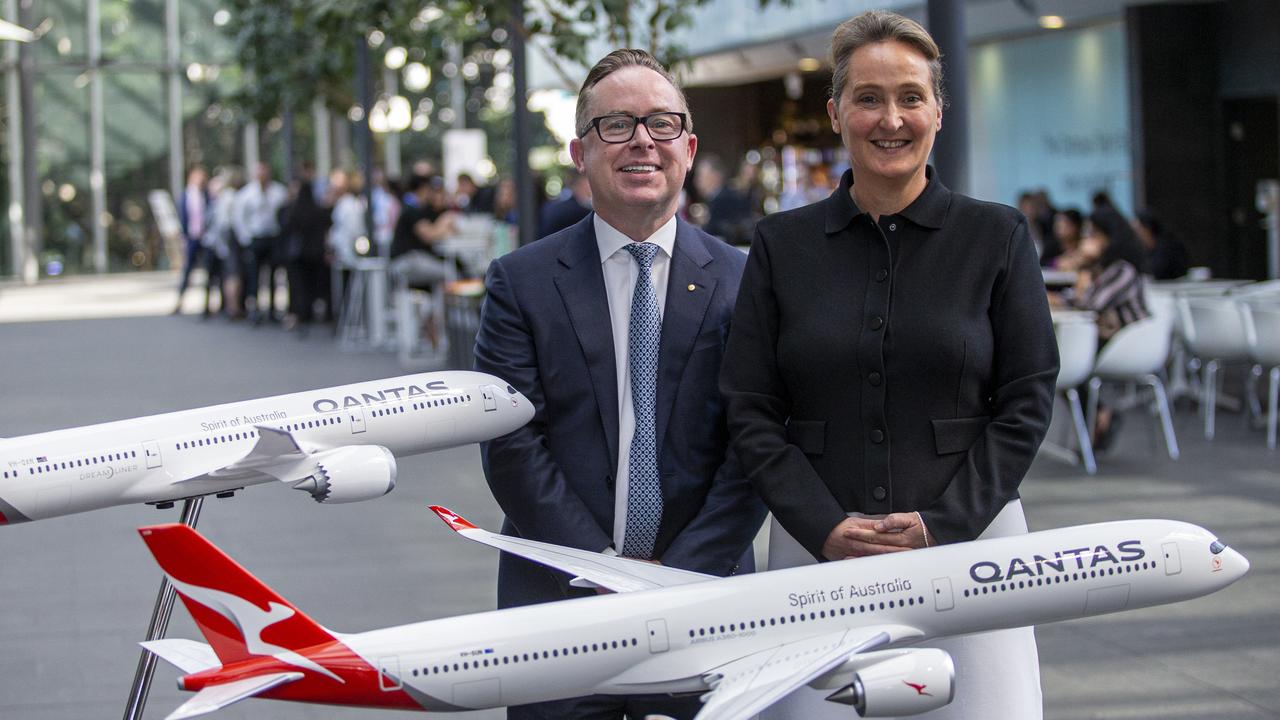Qantas review finds plenty wrong at board and management level, resulting in cuts to bonuses
The Qantas board has delivered a stinging rebuke to former chief executive Alan Joyce in the form of a $9.3m cut to the bonuses he had qualified for.
A review of Qantas’s corporate governance has found an ineffective board and “top-down” culture contributed to the reputational damage suffered by the airline in recent years.
The findings of independent business adviser Tom Saar have been used to justify cuts to executive bonuses, including a hefty $9.3m chop to incentives earmarked for former CEO Alan Joyce.
The decision reduced his long and short term incentives for 2023 from an expected $11.1m to just $1.8m after the review held him ultimately accountable for the problems.
It meant his take-home pay for the previous financial year shrank from more than $24m to $14.9m.
Other executives including new CEO Vanessa Hudson were also rapped over the knuckles in response to the review findings, with their 2023 short-term bonuses trimmed by a third.
The review was prompted by a string of controversies that engulfed the airline in Mr Joyce’s final year as CEO, including lawsuits, poor operational performance, support for the voice referendum campaign, and a huge profit on the back of bloated airfares and cost-cutting.
In a scathing assessment of what went wrong, Mr Saar noted there was “too much deference” to the CEO (Joyce) by the board and management team, and there was a reluctance to “speak up” on issues of concern other than safety matters.
“Leadership culture is part of the root cause dynamic that has underpinned the events under review,” wrote Mr Saar.
“The group had a ‘command and control’ leadership style with centralised decisions and an experienced and dominant CEO.
“This contributed to a top-down culture which impacted empowerment.”
A total of 32 recommendations were made which the board committed to implementing, including an enhancement of performance reviews of the CEO and other executives, regular monitoring of the skills mix of the board of directors and greater discretion for the board when determining the payment of executive bonuses.
Chairman elect John Mullen conceded it was difficult to withhold bonuses from executives and the former CEO when the targets had been achieved on paper, and the review found there had been “no deliberate wrongdoing”.

“If you set the management team a set of objectives, when they achieve them it’s pretty hard to then say ‘well you didn’t achieve something else we forget to tell you about’,” Mr Mullen said.
He said the restrictions on the board making those decisions “added to the complication of this whole exercise – that is being rectified going forward”.
“What is important is that a board needs to have complete discretion because sometimes things happen that you weren’t expecting,” said Mr Mullen.
“We won’t have a problem again in the future.”
Mr Joyce declined to comment on the decision, which left him with the option of going to court if he wants to try to recover his bonuses.
Qantas had been under pressure from shareholders to act on Mr Joyce’s promised bonuses after the executive remuneration report was voted down at last year’s AGM.
On Wednesday investor groups welcomed the actions taken by the board after “a disappointing period of reputational damage and governance failures”. Australian Council of Superannuation Investors executive manager of stewardship Ed John, said the decisions represented “an important step in Qantas’s governance reset”.
“For long-term investors, it is critical that the company learns from the missteps identified and the new board puts all of the recommended changes into practice,” Mr John said.
“Last year, Qantas received one of the highest ever ‘no’ votes on CEO pay from Australian investors. The cancellation of over $9m in incentives is an important step in responding to investor concerns.”
One of Qantas’s largest investors, Hesta, was also firmly in favour of the bonus reductions.
CEO Debby Blakey said the board’s decision and commitment to adopting recommendations of more detailed reporting and improved governance would “help restore investor confidence in the company, and public trust in the airline”.
Australian Shareholders Association chief executive Rachel Waterhouse reiterated her view that the period of reputational damage was disappointing and the governance failings were poor “especially for a national icon”.
“We are pleased the company conducted this independent review, canvassing internal and external stakeholders, and published it,” Ms Waterhouse said.
“We acknowledged the review found no wrongdoing and that the Covid period had been difficult for the company – but that is when better governance would have offered some protection.”
Ms Waterhouse said shareholders agreed with the finding the former CEO held too much power and influence over the board and management team.
“We expect better in the future,” she added.
“And we expect the board to report to shareholders on their progress with the 32 recommendations, as well as whether there is any potential to claw back additional payments associated with earlier years’ awards to Mr Joyce.”
Qantas also announced Mr Mullen would formally take over from chairman Richard Goyder on September 16, with his appointment to be put to a shareholder vote at the AGM.
Qantas shares finished the day down 2.2 per cent at $5.84.
More Coverage
Originally published as Qantas review finds plenty wrong at board and management level, resulting in cuts to bonuses




